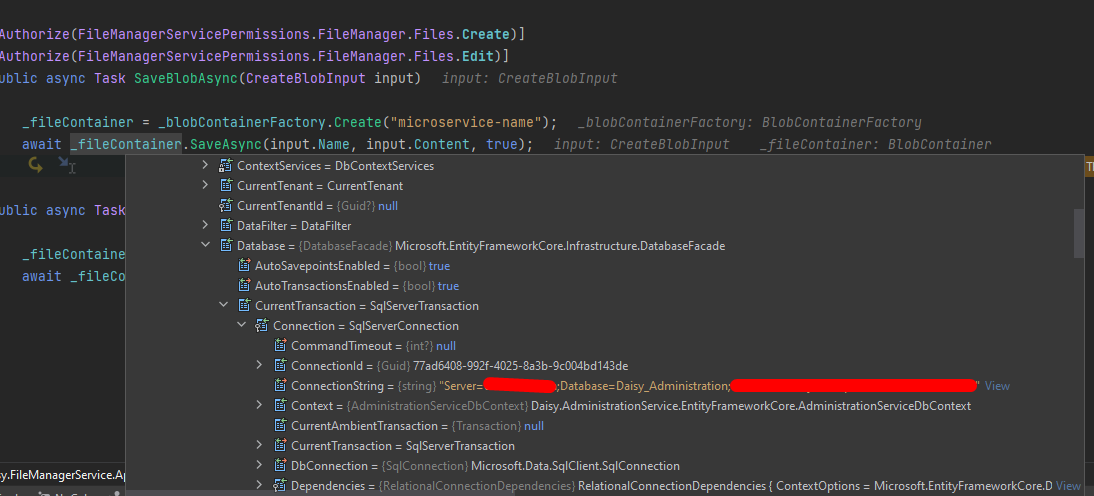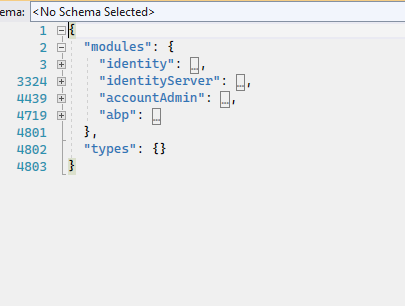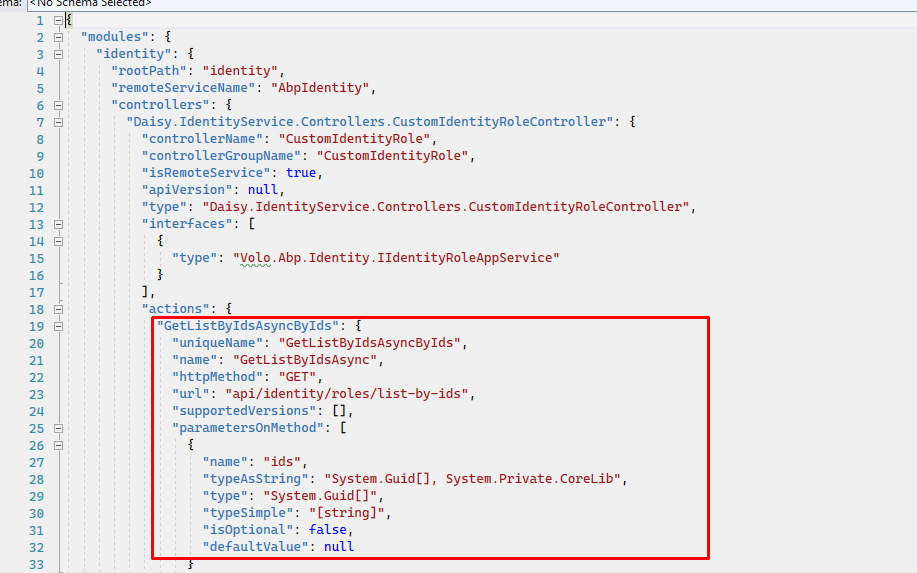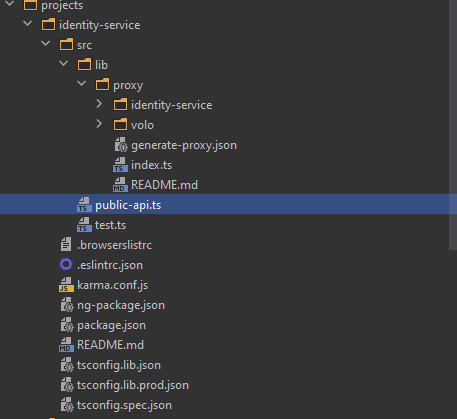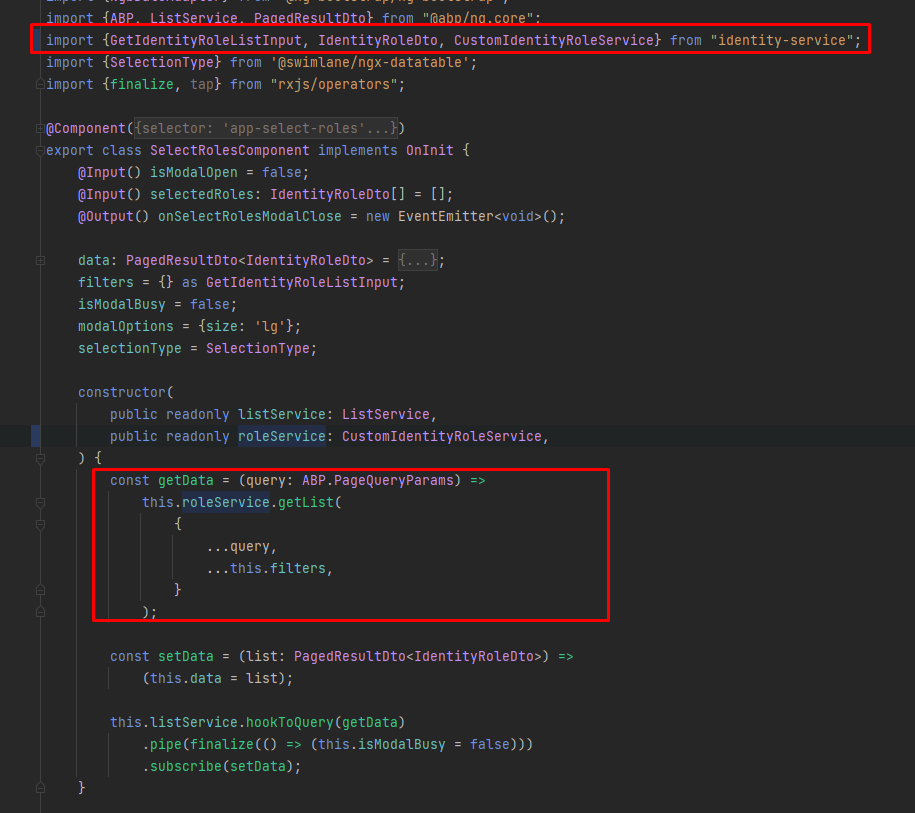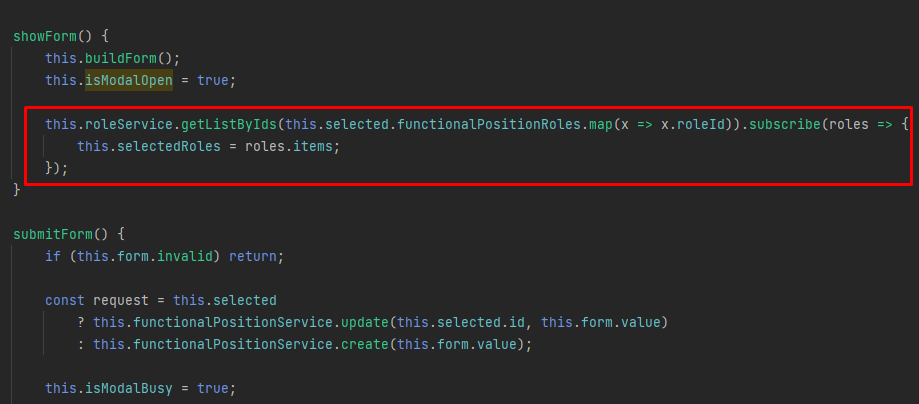Activities of "alirizaadiyahsi"
- ABP Framework version: v5.3.0
- UI type: Angular
- DB provider: EF Core
- Tiered (MVC) or Identity Server Separated (Angular): Angular Microservice
I added a new microservice that named FileManagerService and added database blob storing to it by using this command: abp add-module Volo.Abp.BlobStoring.Database.
All looks fine but when I trying to save files, provider is using AdminstrationServiceDB.
[Authorize(FileManagerServicePermissions.FileManager.Files.FilesDefault)]
public class FileAppService : ApplicationService, IFileAppService
{
private IBlobContainer _fileContainer;
private readonly IBlobContainerFactory _blobContainerFactory;
public FileAppService(IBlobContainerFactory blobContainerFactory)
{
_blobContainerFactory = blobContainerFactory;
}
public async Task<BlobDto> GetBlobAsync(GetBlobRequestDto input)
{
var blob = await _fileContainer.GetAllBytesAsync(input.Name);
return new BlobDto
{
Name = input.Name,
Content = blob
};
}
[Authorize(FileManagerServicePermissions.FileManager.Files.Create)]
[Authorize(FileManagerServicePermissions.FileManager.Files.Edit)]
public async Task SaveBlobAsync(CreateBlobInput input)
{
_fileContainer = _blobContainerFactory.Create("microservice-name");
await _fileContainer.SaveAsync(input.Name, input.Content, true);
}
How I configure blobContainer to use file-manager connection string, instead of using administration-service connection string?
And this is the file-manager-service connection strings in appsettings.json.
And DB
It worked. Thanks @maliming.
- ABP Framework version: v5.2.2
- UI type: Angular
- DB provider: EF Core
- Tiered (MVC) or Identity Server Separated (Angular): microservice/angular
EventHandler Implementation
public class AccessRequestApprovedHandler : IDistributedEventHandler<AccessRequestApprovedEto>, ITransientDependency
{
private readonly IdentityUserManager _userManager;
private readonly ICustomIdentityRoleRepository _customIdentityRoleRepository;
private readonly ILogger<AccessRequestApprovedHandler> _logger;
public AccessRequestApprovedHandler(IdentityUserManager userManager, ICustomIdentityRoleRepository customIdentityRoleRepository, ILogger<AccessRequestApprovedHandler> logger)
{
_userManager = userManager;
_customIdentityRoleRepository = customIdentityRoleRepository;
_logger = logger;
}
[UnitOfWork]
public async Task HandleEventAsync(AccessRequestApprovedEto eventData)
{
try
{
var user = await _userManager.GetByIdAsync(eventData.UserId);
var roles = await _customIdentityRoleRepository.GetListByIdsAsync(eventData.RoleIds);
// Exception is thrown here.
var identityResult = await _userManager.SetRolesAsync(user, roles.Select(r => r.Name).ToArray());
if (!identityResult.Succeeded)
{
_logger.LogError($"Error occured while setting roles for user: {user.UserName}");
foreach (var error in identityResult.Errors)
{
_logger.LogError($"Error: {error.Code} - {error.Description}");
}
}
}
catch (Exception e)
{
Console.WriteLine(e);
throw;
}
}
}
Exception Message (even though I am using UnitOfWork attribute) : A DbContext can only be created inside a unit of work!
at Volo.Abp.Uow.EntityFrameworkCore.UnitOfWorkDbContextProvider`1.GetDbContextAsync()
at Volo.Abp.Domain.Repositories.EntityFrameworkCore.EfCoreRepository`2.EnsureCollectionLoadedAsync[TProperty](TEntity entity, Expression`1 propertyExpression, CancellationToken cancellationToken)
at Volo.Abp.Domain.Repositories.RepositoryExtensions.EnsureCollectionLoadedAsync[TEntity,TKey,TProperty](IBasicRepository`2 repository, TEntity entity, Expression`1 propertyExpression, CancellationToken cancellationToken)
at Volo.Abp.Identity.IdentityUserStore.AddToRoleAsync(IdentityUser user, String normalizedRoleName, CancellationToken cancellationToken)
at Microsoft.AspNetCore.Identity.UserManager`1.AddToRolesAsync(TUser user, IEnumerable`1 roles)
at Castle.DynamicProxy.AsyncInterceptorBase.ProceedAsynchronous[TResult](IInvocation invocation, IInvocationProceedInfo proceedInfo)
at Volo.Abp.Castle.DynamicProxy.CastleAbpMethodInvocationAdapterWithReturnValue`1.ProceedAsync()
at Volo.Abp.Uow.UnitOfWorkInterceptor.InterceptAsync(IAbpMethodInvocation invocation)
at Volo.Abp.Castle.DynamicProxy.CastleAsyncAbpInterceptorAdapter`1.InterceptAsync[TResult](IInvocation invocation, IInvocationProceedInfo proceedInfo, Func`3 proceed)
at Volo.Abp.Identity.IdentityUserManager.SetRolesAsync(IdentityUser user, IEnumerable`1 roleNames)
at Castle.DynamicProxy.AsyncInterceptorBase.ProceedAsynchronous[TResult](IInvocation invocation, IInvocationProceedInfo proceedInfo)
at Volo.Abp.Castle.DynamicProxy.CastleAbpMethodInvocationAdapterWithReturnValue`1.ProceedAsync()
at Volo.Abp.Uow.UnitOfWorkInterceptor.InterceptAsync(IAbpMethodInvocation invocation)
at Volo.Abp.Castle.DynamicProxy.CastleAsyncAbpInterceptorAdapter`1.InterceptAsync[TResult](IInvocation invocation, IInvocationProceedInfo proceedInfo, Func`3 proceed)
at Daisy.IdentityService.EventHandlers.AccessRequests.AccessRequestApprovedHandler.HandleEventAsync(AccessRequestApprovedEto eventData) in C:\Users\aliriza\Documents\Projects\GitHub\Daisy\services\identity\src\Daisy.IdentityService.Application\EventHandlers\AccessRequests\AccessRequestApprovedHandler.cs:line 34
BTW, here is repo method implementation:
public async Task<List<IdentityRole>> GetListByIdsAsync(Guid[] ids, CancellationToken cancellationToken = default)
{
var query = await GetQueryableAsync();
query = query.Where(r => ids.Contains(r.Id)).OrderBy(x => x.Name);
return await query.ToListAsync(cancellationToken);
}
I think it is coming from here: UnitOfWorkDbContextProvider.cs. it seems it can not use the current unit of work.
IdentityUserManager - SetRolesAsync - AddToRolesAsync - userRoleStore.AddToRoleAsync - UserRepository.EnsureCollectionLoadedAsync - GetDbContextAsync() - _dbContextProvider.GetDbContextAsync()
UPDATE:
I also try IUnitOfWorkEnable interface or inherite from ApplicationService but no luck.
It is only working when I manage uow manually. Following is working:
public async Task HandleEventAsync(AccessRequestApprovedEto eventData)
{
_logger.LogInformation("Event name: {@eventName}. User id: {@userId}. Role ids: {@roleIds}", AccessRequestConsts.EventNames.Approved, eventData.UserId, eventData.RoleIds);
using var uow = _unitOfWorkManager.Begin();
var user = await _userManager.GetByIdAsync(eventData.UserId);
var roles = await _customIdentityRoleRepository.GetListByIdsAsync(eventData.RoleIds);
var identityResult = await _userManager.SetRolesAsync(user, roles.Select(r => r.Name).ToArray());
if (!identityResult.Succeeded)
{
_logger.LogError($"Error occured while setting roles for user: {user.UserName}");
foreach (var error in identityResult.Errors)
{
_logger.LogError($"Error: {error.Code} - {error.Description}");
}
}
await uow.CompleteAsync();
}
But I cant understand why [UnitOfWork] attribute is not working?
Hi @liangshiwei, actually I am extending/overriding the end-point in identity-service microservice itself. And it is different then yours.
But yes it doesn't matter. I got your your point. I just ask for better way. Using RestService can be solution. Now, I created a library for identity and generated proxies in it.
I just have concerns about using it this way, if there are drawbacks.
- ABP Framework version: v5.2.2
- UI type: Angular
- DB provider: EF Core
- Tiered (MVC) or Identity Server Separated (Angular): no, Microservice
Identity API
I am customizing Identity module according to this document: Customizing the Application Modules
I extended IdentityRoles service/repository/contoller so I have a method _roleService.GetListByIds(Guid[] ids). Everything is ok, so far. The end-point is working like expected.
Identity Angular
Question: I am creating ng-library for my each microservice to generate proxies, separately (reference:Microservice Proxy Generation). To use my new method that is in IdentityRoleService, should I create an ng-library for identity and generate identity proxies in it? So, as I understand, I will use these proxies instead of using them from abp/ng.core?
Any suggestion would be appreciated! Thanks...
Hi @muhammedaltug, your advice worked for me. It should be in Microservice documentation.
